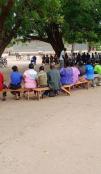|
In the frame of the KULIMA programme, this action is in support of the KULIMA Farmer Field School activities. It is expected to provide the necessary agriculture research innovations to increase productivity and diversify production by Malawian farmers in view of food security, improved nutrition and enhanced income potential.
The project was designed on the background of the availability of different CGIAR centres conducting research activities in Malawi. It was considered that mobilizing the various CGIAR centres constituted a good opportunity to access the innovations developed by the various research centres in Malawi in close collaboration with the national research department (DARS).
The current project involves thus participation of 7 CGIAR centers (CIP, CIMMYT, CIAT, ICRISAT, ICRAF, IITA and World Fish Center) under coordination by GiZ. The CGIAR centres provide technical training to the Master Trainers (MTs) and Community Based Facilitators (CBFs) in their respective areas of specialisation. In addition to this, CGIAR centres are involved in practical exposure of the trainees to the various technologies through field trials established around the (Research Training Centers) RTCs with topics articulated on 6 packages of integrated technologies which are as following:
- integrated soil fertility management and on-farm conservation
- conservation agriculture
- tree/agroforestry-based farming system
- integrated pest and disease management
- aflatoxin control and (f) integrated agriculture-aquaculture.
At the end of the 3rd year of implementation, the following main achievement can be highlighted:
- Completion of 2 technical season long training of FFS master trainers at the three residential training centers,
- Delivery of three refresher training sessions for the first cohort of MTs,
- Finalization of KULIMA CGIAR seed supply system development concept; in support to this, selection of commodities to be used has been achieved around the following ones (i) legumes, (ii) cereals, (iii) root & tubes, (iv) agroforestry trees and (v) aquaculture-fish.
- Capacity building of seed actors including agro-dealer, seed multipliers and community seed banks,
- various training manuals have been developed by the different CGIAR centres comprising the following documents: (a)Agroforestry modules training manual [ICRAF], (b) Common bean production manual [CIAT], (c) Brochures on Conservation Agriculture and maize varieties [CIMMYT], (d) Growing soybean in Malawi [IITA], (e) Growing cowpea in Malawi [IITA], (f) Aflatoxin control using Aflasafe [IITA] , (g) Cassava growing training manual [IITA], (h) Fish farmers training guide and Pond aquaculture [WFC], (i) Training guide for groundnut, pigeon pea, sorghum, and finger millet [ICRISAT] , (j) Potato production training manual [CIP] and (k) Sweet potato production training manual [CIP]
- Adoption of some modern crop varieties but also identification of some highly preferred local cultivars successfully maintained by farmers based on the local preferences; the example of the Chalimbana groundnut variety illustrates that maintenance of local cultivars in addition to the modern varieties
- Effective linkage with the agribusiness component of KULIMA programme through provision of support to farmers working with Tropha Estate Ltd in the districts of Thyolo and Mulanje: this was around the value chains of Chilli and paprika
- Advancement towards increased integration of crops around fish ponds covering beans, soybean, vegetables, bananas and sweet potato; in this context specific training has been provided to 3 fish hatchery operators in Mzuzu, Thuchila and Lisasadzi in support to the current development of agriculture-aquaculture
|






